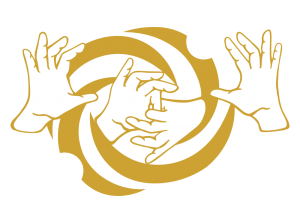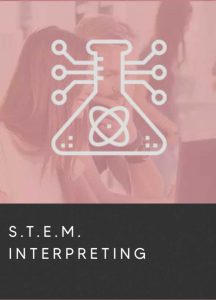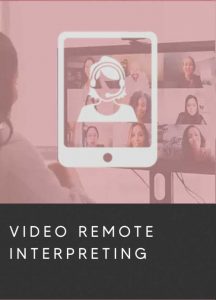A quality ASL interpreter might be the difference between a Deaf client loving your proposal, and “giving it somefurther consideration.” Or maybe the difference between the Deaf attendees thinking your play was a masterpiece, verses thinking it was “pretty good.” An interpreter should exhibit the same passion for their job as the person who hires them.
Sign Language interpreting is certainly not a textbook profession!  One day, an interpreter might be asked to interpret divorce proceedings in a courtroom setting; the next, they might be asked to interpret an executive’s corporate presentation. This unique career choice requires a dynamic individual with a love for customer satisfaction. In my last post, I discussed how to hire an interpreter, and now I would like to talk about what merits a capable interpreter.
One day, an interpreter might be asked to interpret divorce proceedings in a courtroom setting; the next, they might be asked to interpret an executive’s corporate presentation. This unique career choice requires a dynamic individual with a love for customer satisfaction. In my last post, I discussed how to hire an interpreter, and now I would like to talk about what merits a capable interpreter.
 A high-quality interpreter will have real world experience, a flexible attitude, and a willingness to keep up to date on relevant industry news. These individuals will be confident in their knowledge, will never accept a job they do not feel prepared for, and are not afraid to ask questions. Quality interpreters also maintain an established network of others in the field. Interacting with other interpreters allows us to bounce ideas back and forth, work through problems that arise, and better understand our own limitations.
A high-quality interpreter will have real world experience, a flexible attitude, and a willingness to keep up to date on relevant industry news. These individuals will be confident in their knowledge, will never accept a job they do not feel prepared for, and are not afraid to ask questions. Quality interpreters also maintain an established network of others in the field. Interacting with other interpreters allows us to bounce ideas back and forth, work through problems that arise, and better understand our own limitations.
Unfortunately, some individuals go right from their certification program to interpreting, which can be a bit isolating. This is a quick way to become overwhelmed, confused, and put a damper on the passion for the job. While the Interpreter Training Program is critical to learning our code of ethics and the more technical side of Sign Language; like any other career, a certificate does not make one an expert!
 I cannot emphasize the value of mentoring enough. Having a mentor is an invaluable way to learn the ins and outs of Sign Language interpreting; the kind of things they don’t teach in school. An experienced mentor will help identify strengths and weaknesses; understand the more emotionally challenging aspects of the job; and prepare for the pressures of being on-the-spot. In this field, there is always room for growth. Without someone providing guidance, it is easy to take a job beyond our scope, become discouraged, or fall into bad or stale habits.
I cannot emphasize the value of mentoring enough. Having a mentor is an invaluable way to learn the ins and outs of Sign Language interpreting; the kind of things they don’t teach in school. An experienced mentor will help identify strengths and weaknesses; understand the more emotionally challenging aspects of the job; and prepare for the pressures of being on-the-spot. In this field, there is always room for growth. Without someone providing guidance, it is easy to take a job beyond our scope, become discouraged, or fall into bad or stale habits.
A mentor can be the difference between a good interpreter and a great interpreter. I am pleased to offer ASL mentoring through LC Interpreting Services because I love to share my passion for communication with others. Deaf and Hard of Hearing individuals deserve high-quality interpreters, and all interpreters deserve to love what we do!

















 One day, an interpreter might be asked to interpret divorce proceedings in a courtroom setting; the next, they might be asked to interpret an executive’s corporate presentation. This unique career choice requires a dynamic individual with a love for customer satisfaction. In my last
One day, an interpreter might be asked to interpret divorce proceedings in a courtroom setting; the next, they might be asked to interpret an executive’s corporate presentation. This unique career choice requires a dynamic individual with a love for customer satisfaction. In my last  A high-quality interpreter will have real world experience, a flexible attitude, and a willingness to keep up to date on relevant industry news. These individuals will be confident in their knowledge, will never accept a job they do not feel prepared for, and are not afraid to ask questions. Quality interpreters also maintain an established network of others in the field. Interacting with other interpreters allows us to bounce ideas back and forth, work through problems that arise, and better understand our own limitations.
A high-quality interpreter will have real world experience, a flexible attitude, and a willingness to keep up to date on relevant industry news. These individuals will be confident in their knowledge, will never accept a job they do not feel prepared for, and are not afraid to ask questions. Quality interpreters also maintain an established network of others in the field. Interacting with other interpreters allows us to bounce ideas back and forth, work through problems that arise, and better understand our own limitations. I cannot emphasize the value of mentoring enough. Having a mentor is an invaluable way to learn the ins and outs of Sign Language interpreting; the kind of things they don’t teach in school. An experienced mentor will help identify strengths and weaknesses; understand the more emotionally challenging aspects of the job; and prepare for the pressures of being on-the-spot. In this field, there is always room for growth. Without someone providing guidance, it is easy to take a job beyond our scope, become discouraged, or fall into bad or stale habits.
I cannot emphasize the value of mentoring enough. Having a mentor is an invaluable way to learn the ins and outs of Sign Language interpreting; the kind of things they don’t teach in school. An experienced mentor will help identify strengths and weaknesses; understand the more emotionally challenging aspects of the job; and prepare for the pressures of being on-the-spot. In this field, there is always room for growth. Without someone providing guidance, it is easy to take a job beyond our scope, become discouraged, or fall into bad or stale habits.





